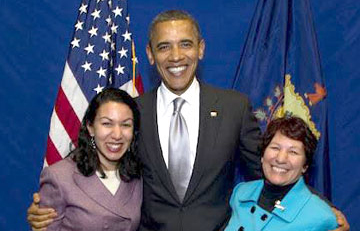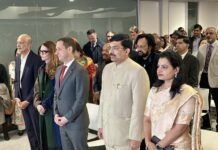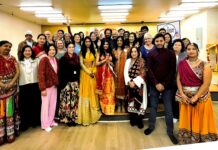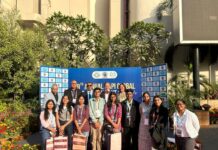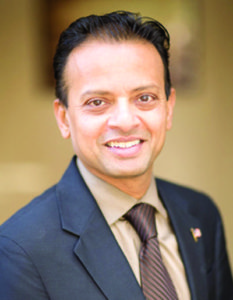 SATYAGRAH SOULS is a monthly politi-cal series presented by Silicon Valley’s community leader, Saratoga Councilmember Rishi Kumar, in highlighting the community involvement and success of Indian Americans in the United States. This series seeks to inspire us in giving back to our local community. We Indian Americans are going through a transitional evolution, as we get entrenched in a new world, embracing new culture, exerting zealous work ethics, supporting the American economy as entrepreneurs, high tech geeks, doctors, lawyers and more.
SATYAGRAH SOULS is a monthly politi-cal series presented by Silicon Valley’s community leader, Saratoga Councilmember Rishi Kumar, in highlighting the community involvement and success of Indian Americans in the United States. This series seeks to inspire us in giving back to our local community. We Indian Americans are going through a transitional evolution, as we get entrenched in a new world, embracing new culture, exerting zealous work ethics, supporting the American economy as entrepreneurs, high tech geeks, doctors, lawyers and more.
We are definitely imposing the positive intentions and good citizen values upon this fantastic country and making a huge impact.
But can our involvement run a bit deeper with issues near and dear to our hearts, perhaps within our local city, or with the local public school that our children attend? Do we sometimes hear our conscience imploring, “Am I doing enough?” Yes we can get involved just a bit more, push our comfort zone and enhance the learning and impact our involvement. Our involvement can simply start with developing a healthy curiosity in our local community, instead of being ‘busy’ bystanders. Once we get involved, we will quickly discover, how easy it is for us to make progressive change happen and how receptive everyone around is, to leverage our skills for it. There are leaders waiting to be discovered, why not “me”, by taking that first step? The give-back experience can be freeing, energizing – personally rewarding and transformative at the same time.
There are many who have made their mark in doing just that. With this monthly series, we want to highlight these SatyAgrah souls who are showing us the path. Here is a SatyaGrah soul, who has found the calling:
***********
SPOTLIGHT
State Legislator of Vermont
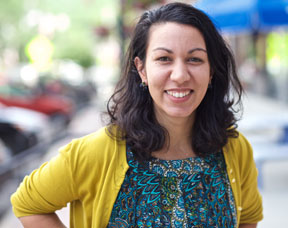
Kesha was elected at 22 to represent Burlington in the Vermont House of Representatives and served four terms. She served on the House Ways & Means Committee, Housing & Military Affairs Committee, and Natural Resources & Energy Committee, where she was Vice Chair. In 2016, she left the legislature to run for Lieutenant Governor, falling short in her bid but becoming the first woman of color to earn a double digit share of the vote in a statewide race.
Kesha’s early years were spent in Los Angeles, where she was raised in her Indian immigrant father and Jewish American mother’s Irish pub. She learned the value of hard work, giving back, and pitching in to support a family business. Throughout her legislative career, Kesha has passionately championed those values she learned early in life, working to expand tax incentives for statewide economic growth, create green jobs, create paid family leave, expand early and higher education opportunities, and promote civil rights. Through all of her work, Kesha has focused her energy on building an economy that works for all Vermonters and creates pathways out of poverty.
Kesha is now the Interim Director of the Center for Whole Communities, working at the intersection of conservation and social justice. In the fall, she will be attending the Harvard Kennedy School of Government to earn Mid-Career Master of Public Administration. She has also worked as the Public Engagement Specialist for the City of Burlington Community and Economic Development Office, the Legal Director for Steps to End Domestic Violence, and as a preschool teacher. She currently serves on the boards of Emerge Vermont, Main Street Alliance of Vermont, Justice for All, and the Vermont Natural Resources Council, and is a Truman Scholar and Oxfam “Sister on the Planet” Climate Change Ambassador.
************
It’s important to do something than be somebody
Rishi: Kesha, it is good to finally connect with you. The goal of our Satyagraha Souls series is to essentially inspire the Indian American community and just get them to engage a little bit into the community; perhaps that might lead to political leadership. We seek to provide exposure to figureheads from across the United States, folks who have been engaging with their local communities who are elected leaders. So in the past we have covered Congresswomen Pramila Jayapal, we have covered Congressman Raja Krishnamoorthi, Congressman Ro Khanna, Congressman Ami Bera, we have covered State Legislators Kumar Barve, Ash Kalra and many more. I’m glad we’re finally converging today with our calendars and we’re able to chat, so thank you for taking the time.
KESHA: Yes, It is very nice to chat with you.
RISHI: Let us get started. I have a question about your background. You grew up with a Jewish mother and a Hindu father. When we look at our Indian American community here, we could very well model ourselves after the Jewish American community that have done very well. And, it seems culturally we are a little bit aligned. I just wanted to get your thoughts on that.
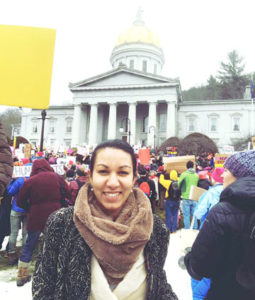
KESHA: Yeah, I would say my upbringing was quite unconventional. I, as you said, have a Jewish American mother who was originally from Chicago, and my late father is from the part of India that became Pakistan, originally. And then, they met in college, at UCLA, and opened an Irish pub together in Los Angeles, so [laughter] they raised the three of us in their Irish pub, sort of learning how to give back and pitch in, and not really take anything for granted. And I have thought a lot about the importance of having a sense of community and accountability to people beyond you, to your parents importantly, but to other adults that, you know, stay engaged in your life and push you to be the best you can be.
And I do, without trying to stereotype or generalize, feel that I experienced that in equal measure on both sides, with having Indian and Jewish relatives. It was always funny to have Jewish folks, saying, oh you must get a lot of guilting or pushing you to be successful from the Jewish side.
I was like, believe me, Indians are very much the same. [laughter] Yeah, and I think both have a healthy and robust relationship to civic life, and civic participation, always thinking about how to give back, but the Indian community is newer in stretching its wings, in terms of political life as a part of civic life.
I think what’s interesting is that might take shape in a generational, in an intergenerational conversation about how politics can come full circle in the Indian community, that Indians created some of the greatest methods of protest and non-violent resistance that exist in the political realm. And, young Indians have the opportunity to really reengage and think about our legacy of leadership and activism from that perspective. So, while our parents and our grandparents may be worried for us if we take to the streets or get fully politically active, it’s a big part of all of our history, and so I see that as a really valuable way for us to be relevant in a critical moment for our country.
RISHI: Excellent. So, Kesha, what I’m hearing is that political activism is sort of part of our DNA, but something we have not exactly gotten involved with. You know many of us came into this country as first generation immigrants; we are still trying to establish ourselves in the country, so perhaps we have not engaged, we are still new to the country. But you don’t see any issues at all from the standpoint of engaging when there is a need; you expect the Indian community to rise and do what needs to be done?
KESHA: Exactly, I expect that, and it’s sometimes easy for our parents and grandparents to worry about us, because they may have been concerned about exposure, on that front. But they gave us the gift of feeling very safe and welcome in this country and established, and I hope they see it as us honoring that gift to use our voices and very strongly speak up for our political beliefs in this critical juncture.
RISHI: You probably see the Jewish American community, you see the Indian American, and in your state of Vermont, you see a wide variety of demographics and how they engage. Do you get a sense that the Indian American community is a little shy, and they are not willing to express or be involved?
KESHA: I had a story that may be common among Indian political players, where my grandmother would hope that I went back into music, rather than [laughter] do politics. She thought I would never earn enough, and it wasn’t a particularly noble procession. She was always very proud of me, but she definitely didn’t understand how I could make my life out of political engagement, let’s say. [laughter] My father had very strong political beliefs and instilled that in me, but for him it was a matter of gaining a foothold in the economy – starting a business, bringing people together over food, and keeping politics in the private realm. He still was very proud, and he should have been.
He was a big part of how I learned how to assert myself and stand up for my beliefs. I would be giving a talk to a group of Indian Americans, and they’ll say oh, I wish my daughter could be more like you – she’s only a doctor, or she’s only running this business, or this firm or agency.
And I would say, well, it’s funny, I think my family would say I should be more like your daughter. [laughter] I think my overall message is, you know, as someone who has been in elected office since I was 22 years old, the kids are alright. Our generation really is finding our way, and it’s really thanks to the generations that have come before us, but I just don’t want those generations to feel like we’re not fully honoring everything they’ve given us to work with, when we go out and speak in the political realm and engage in the political realm.
RISHI: I heard about your father’s passing, and it sounds like he inspired your run, and that he is one of the inspirational figures. You were in the [Vermont] House of Representatives at the age of 22, and that’s probably a world record of sorts. [laughter]
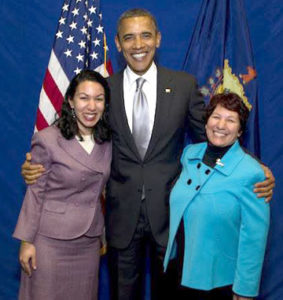
KESHA: Not a world record. [laughter] Yeah, my parents were a major influence. My father more; he always taught us to think about who was left behind. It meant that at times he could be very critical of politics and people who engaged in politics, because he always would try to focus on the virtue, and saw a lot of politicians as in it for power or personal gain, and so, that stuck with me for a long time. If I was going to go into politics, I was going to do it to do something, not be somebody.
And, my mother, it was more in the exposure she gave me to women and civil rights leaders in politics; it was important to her that I read biographies and understand those in this country and around the world who fought and lost opportunity and, in some cases, lost their lives for me to participate. So, who am I not to take that mantle of responsibility and make sure that the next generation has more opportunities and has more equity on which to build representation and political opportunity.
RISHI: So, Kesha, you talked about, you touched upon it, which is what your dad was talking about. From an Indian American perspective, we have sort of very pacifist roots; we are hard working, we bring a level of pragmatic intelligence to our work and community, and that’s what I see in Silicon Valley here. We are sort of helping the economy, we have very positive intentions. And, is this something that is a strength for us in terms of how we will grow from this that we offer to America, as one of the highest earning demographics in the country, into becoming a little bit politically energized? Is that a strength that you think we have?
KESHA: Well, the opportunity is there, and all the conditions are there. Indian Americans are high earning, they’re well-educated, they give back quite a bit in their communities. What the gap is turning that into results in the voting booth. I’m sure you’ve heard that before, from folks, who are lamenting that there are many in the Indian community who might give money but don’t see translating into their need to vote.
We are people who come from the largest democracy, and are now in the oldest democracy, and so we will quickly be able to turn that around, with a little bit of engagement and focus. What I think is our real opportunity is to really jumpstart our representation at all levels. What I think is important for the Indian community to latch onto and they have started to, is that it’s not just about Congress. Congress is pretty backlogged right now.
It’s hard to imagine what will get done in Washington, and yet our states are huge experiment stations and thought leaders or what we can do to improve our access to healthcare, education, some of the basics that the Indian American community cares a lot about. So what I would like to see as well is for the Indian community to realize they can get great return on their investment, for supporting candidates from city council and school board all the way to state legislatures and governorships. And right now that’s probably where a lot of the opportunity for change lies.
RISHI: Kesha you make a very good point, because I think we are sort of enamored by the glamour positions of Congress and everything else, but politics is local, and we can contribute probably a lot more. So what would it take for us Indian Americans to engage in these non-glamorous city councils, school boards? What do you think about how our Indian American population could engage themselves a little better in these roles? It probably starts from voting. What do you think should happen for us to get engaged locally in these other political roles that will help us get started?
KESHA: The good news is it’s not hard for us to go from marginalized to the margin of victory. We have the numbers, and we have the right mindset. It’s just about getting organized and thinking a little differently about participation. So as simple as voting, and it sounds simple, but it’s still something people need encouragement, or a push, or accountability. And there are new Asian American/Pacific Islanders organizations that are getting started to build that mobilization and make it more convenient and urgent for the Indian American community to vote.
The good news is it’s also really easy to participate in local government. If you look around you, often people are begging folks to run for local boards, commissions, and so when business leaders say I want to get someone in Congress who listens to my interests, actually your local elected officials are going to fall all over themselves to listen to your interests.
So just making sure that you’re calling in about issues you care about or seeking to get an appointed position on a local board or commission or even running for office; often these local elections are uncontested, because it takes up time and energy. But if people are retired or find themselves with time in the evening, it’s actually not that hard to keep your full-time commitments to work and family and serve on one or two local civic boards, so that you can really have a voice on what your open space looks like, or how your child’s school is run, or what the business climate looks like in your community.
RISHI:: Yes, and that can be very energizing and empowering; once we engage we can realize the potential of taking and creating an impact of our intentions in the local community, and I think that’s the story that’s popping out, based on what you said.
KESHA: Exactly, and what I do what to emphasize, because it’s just in my DNA, is that what has been really exciting for me is this was a breakout year for Indian women, for women like Pramila Jayapal and Kamala Harris, and even for me to run for statewide office and break a lot of barriers to do that. I want to really emphasize that no matter which culture we’re in, it’s often men that might look in the mirror and say Sure, I’ll go run for the city council, and it’s not as often our women and girls. And we need to be just as encouraging of their voices and their participation, or we won’t be fully representing our community.
RISHI: Absolutely! We would love to see 50% women in Congress and in the Senate as well.
KESHA: Exactly, it’s quite innate to our community. But Indian women face the same barriers that women face around the country, so giving a little extra attention to that will help go a long way.
RISHI: You said it! When I look at India, you know, we had a prime minister of India, back in, what was it, late 60’s, Indira Gandhi, who was a female, and I don’t think the population looked at it as it was a female thing; it was just that she was perfect for that job which she took over. Do we have a slightly different viewpoint, perhaps in this country? We just got to create opportunities for women as well, specially with the young girls at school, we just need to show them the roadmap, here is what you could potentially do.
KESHA: Exactly, I talk to young Indian women all the time who are figuring out how to chart their path forward, and unless they see those role models, they don’t know they can be that person. So, it does help for them to see someone who is just not afraid to speak up and assert themselves because politics in the US can be quite aggressive or challenging. So, as we think about the humility that a lot of Indians carry with them, just important that we recognize you can be a thoughtful and humble leader and still put yourself out there.
RISHI: So, let’s shift gears a little bit. We had a couple of issues that happened that impacted the Indian American community, which was: there was a shooting in Kansas, and in Seattle, and then we see a few incidents here and there which are very minor but seems like the climate of the country has changed a little bit. What would you like to do or, perhaps, you would like the Indian American community to do, to address this problem?
KESHA: Yeah, when my father came to the United States sixty years ago from India, the first thing he heard was someone yell to him on the street go back to Mexico. After September 11, he didn’t leave the country for ten years, because he was just afraid he might not be able to get back in. So, we find ourselves as a very unique moment in time, but one that our community has been through in various ways before. And I think it’s a valuable reminder that we sit at a really interesting intersection for different communities in the United States.
That we often enjoy the benefits of upward mobility and our own accountability towards success, but that doesn’t make it any different for us as a target of xenophobia and hatred, because often people might not know exactly where we’re from but they can associate us with cultural groups that are experiencing a lot of bias and hatred right now. So, in that context, we have the unique ability to empathize and to find new ways of connecting with other immigrant communities and other communities of color to help be a united voice. And I know that’s been my role in Vermont, which is a very white state, but I have taken on this role of being a cultural broker for all kinds of new Americans and farm workers and people who don’t otherwise have any representation at all.
I may not come from their specific community, but I know what it’s like to walk down the street and feel treated differently. And if we can continue to put ourselves in the shoes of others, we can play a pivotal role in making sure that we maintain our democratic American values through what is a trying time.
RISHI: That is a wonderful way to look at things. So, one final question, what’s your final words for an Indian American who’s looking to engage in the community and perhaps lead a specific issue or would like to find a position of leadership in the community, what’s your final words of inspiration for them?
KESHA: Yeah, figure out what your passion is, and how you can make a difference, because it’s important to take a leadership role, to do something rather to be somebody. That will make you happier, ultimately, because you’re in it for the right reasons and you’re not simply, you know, we as Indians are good at thinking about our ego and trying to absolve ourselves of it, and politics is not for those with fragile self-images.
So, if you’re in it for all the right reasons, and you are making a difference, and you are elevating others who need a voice, then you’ll feel good about what you’re doing every day. Those people are needed in the political realm now more than ever; we’re at a really critical moment where people are being empowered to engage in politics for very different reasons.
We know that many in our community want to engage for all the right reasons; to expand opportunity and to make sure the next generation has every tool they need to be successful and to bring our country closer together. And if those are your aims, I and so many others who are currently in leadership will do everything we can to help those next generation of leaders to rise up as well.
RISHI: To summarize, what I heard was putting the whole service aspect of our engagement is probably more important than anything else; putting the self, the ego behind is really what I heard from you, correct?
KESHA: Right, if you’re going into this so that people celebrate you every day, you’re in the wrong business. Politics can be really difficult, but it’s rewarding if you wake up every day thinking How can I be service to others?
RISHI: Kesha thank you! We wish you success with all future endeavors.
**
Dear Readers, Do you have a story to share? We invite you to introduce us to folks in your community who are making a difference – we would love to profile them. Are there similar stories you are familiar with locally. The ones who helped address a simple issue in the community to make life a bit better. Perhaps someone you know decided to make a run for school board, was appointed to the planning commission. Provide us your insights on Indian Americans locally and nationally who are making things happen. These perspectives will help construct roadmaps for our community to empower ourselves, to hopefully ignite a desire in all of us to represent our local communities as doers, leaders, establish and entrench ourselves in this glorious country of America and help make it a better place
********
ABOUT RISHI: Rishi is an elected city councilmember in Saratoga, CA and politically active in the state of California, as a board member on a few state and national political organizations. He continues to follow his passion for community service, seeking to provide services to his constituents cheaper, faster and better, in making a difference. Rishi has diligent service, community outreach and engagement a key focus for his political leadership as a strong independent voice. As Silicon Valley’s community organizer, Rishi is host of many social, educational, cultural community events, many of which are free and always inclusive usually addressing a need or a cause. Rishi’s day job is as a Silicon Valley hi-tech executive but his zeal for service effervescent. Rishi is also the President of the Bay Area Indian American Democratic Club (www.baiadc.org) whose charter is to further the interests and values of Indian Americans, work towards political empowerment and advance ethical standards in the political system. You can reach him via his website www.RishiKumar.com.

